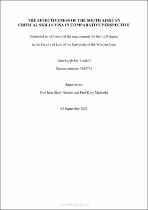| dc.description.abstract | There are notable skill shortages in South Africa. This thesis explores the reasons behind the skills shortages, including the impact of apartheid on education, brain drain, brain waste, and lack of apprenticeships. Currently, there are skills shortages across many occupations, including managers, professionals, and artisans. Many employers struggle to find qualified employees to fill open positions, and citizens are unlikely to fill occupations critical to economic development soon, due to systemic issues affecting skills formation. After the apartheid era, the South African state recognised the need for skilled migrant workers to fill critical occupations. The South African state introduced visas, with the aim of alleviating skills shortages by enabling the recruitment and employment facilitation of skilled migrant workers. Regrettably, the state did not receive a significant number of skilled migrant workers. Currently, the Critical Skills Work Visa exists to facilitate the employment of skilled migrant workers in South Africa. Merely possessing a visa is not enough to entice skilled migrant workers to work and reside in South Africa; additional measures are required. The thesis explores the factors that influence skilled migrant workers’ decisions to work and live in South Africa and those that discourage them from doing so. It is acknowledged in the thesis that skilled refugees and skilled asylum seekers may also contribute to alleviating skills shortages. While members of this group are not excluded from applying for critical skills work visas, they are confronted with additional, and significant, obstacles in their pursuit of these visas. The probability of being granted a critical skills work visa is unlikely for most of them, resulting in brain waste. A comparative analysis is used in the thesis to compare the effectiveness of the Critical Skills Work Visa to that of similar visas in Botswana, Canada, and New Zealand. The thesis concludes with recommendations for improving the effectiveness of the Critical Skills Work Visa. It has been determined that visa requirements are not the sole factor that dissuades skilled migrant workers from selecting South Africa as their work destination. In order to attract skilled migrants, the South African state must enhance its legal framework to conform to international benchmarks, create a proactive immigration regime, and address inconsistencies between the immigration framework and how the Department of Home Affairs applies it. | en_US |

